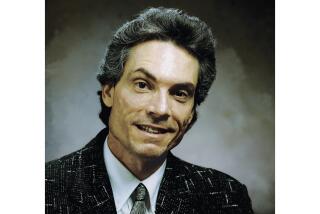Russ Reid dies at 82; creator of pioneering World Vision infomercials
There was a time when Christian charities would raise money by showing films of their good works in church basements.
Then Russ Reid, a marketing man who specialized in religious groups, came up with a bold plan for World Vision, a client that sought to feed the world’s poor: Buy an hour of TV time and hire a camera crew to roam the world with a warmhearted celebrity, introducing viewers to impoverished children.
Even if the grand effort flopped, there would be a saving grace, he jokingly told a dubious charity executive: “You’ll have the most expensive church film ever made.”
Reid’s 1971 brainstorm succeeded beyond his expectations. With help from Reid’s productions, World Vision grew from a modest organization with 60 workers to a billion-dollar network with 45,000 employees in nearly 100 countries. The charity’s infomercials, with their poignant images of starving children and urgent requests to “just pick up the phone,” became TV fixtures and were widely imitated.
Reid, a pioneer in promoting faith-based charities with the Madison Avenue techniques they had long shunned, died Dec. 7 at his home in Sierra Madre. He was 82.
He had Parkinson’s disease and died of pneumonia, his family said.
While Reid retired in 2001, the agency he founded still bears his name. Based in Pasadena, it has raised funds for groups such as Boys Town, St. Jude’s Children’s Research Hospital, Mothers Against Drunk Driving, the National Coalition Against Pornography, and Habitat for Humanity. It represents some 85 rescue missions across North America, according to Tom Harrison, its chairman.
Reid’s perception of charities was simple, Harrison said: “These guys know how to do their work but not how to tell their story.”
To many of them, aggressive marketing was unseemly.
In a 1987 talk to the Assn. of Gospel Rescue Missions, Reid recalled a pastor on a conference stage being worried about how to introduce him moments later.
“Would it be possible for me to introduce you as anything other than the president of an advertising agency?” the pastor whispered.
“No,” Reid responded. “That’s what I am.”
Reid is credited with a number of innovations in charity fundraising. In 1968, he was among the first to “personalize” computer-generated charity mailings by including recipients’ names in solicitation letters.
He picked up the idea from a direct mail piece put out by an auto dealership, said Bill Kliewer, a former executive vice president for World Vision USA. Similarly, Kliewer said, an evangelist’s paid time on TV inspired “Children of Zero,” Reid’s pioneering 1971 production for World Vision.
“Somehow he got Art Linkletter to host our first TV show,” Kliewer said. “We went to Korea, Hong Kong and Vietnam. My wife held his cue cards.”
Subsequent TV productions were anchored by “Jeopardy!” host Alex Trebek, actress/singer Julie Andrews and other celebrities.
In the 1980s, Reid helped the foundering Los Angeles Rescue Mission regain its footing, said Gifford Claiborne, a former agency executive.
Struggling just to pay its bills, the mission had 3,000 donors in 1982 and a yearly budget of just $125,000. Five years later, after a barrage of direct mail pieces, newspaper ads and telethons engineered by Reid, some 90,000 donors contributed about $5 million annually.
“He was such an amazing entrepreneur,” said Claiborne, who first met Reid, an ardent violin player, while he was singing in a gospel quartet.
Reid’s agency came up with the evangelical “I Found It!” bumper stickers for Campus Crusade for Christ, creating a slogan that generated instant parodies as well as widespread publicity.
But not all of his ideas were winners. His National Caring Network – a plan to buy all of the time on a cable channel and re-sell it to nonprofits for round-the-clock charity broadcasts – went nowhere.
“It presupposed that people wake up in the morning saying, ‘Sweetie, it’s time to give away more money—who should we give it to?’ ” Harrison said.
In interviews, Reid said he aimed for mass appeal, not influence over some elite demographic.
“You look at the big money that’s given to charities: Where’s it coming from? Not foundations, not corporate givers, not major donors, but from Johnny Lunchpail,” he told The Times in 1985.
Born on Jan. 9, 1931, in Vancouver, Canada, Russell Charles Reid grew up poor and left school after 10th grade, his daughter Anne Oppermann said in an interview.
Raised in a fundamentalist church, he was convinced that he was meant to be a missionary in Peru. For years, though, he struggled against the growing realization that he wasn’t cut out for that line of work.
“My father was a man who liked creature comforts,” his daughter said, laughing. “I can’t imagine him being a missionary in Peru. He wasn’t a camper.”
As a young man, Reid was program manager for a Christian radio station in Seattle. Before starting his own agency in Park Ridge, Ill., he worked for Word Publishing in Waco, Texas, a marketer of Christian books and records.
Headquartered in Pasadena with offices in Fairfax, Va., and Toronto, his 300-person agency was acquired by Omnicom Group Inc. in 1998.
Divorced in 1978, Reid is survived by Cathie, his wife of 30 years. In addition to his daughter Anne, he is also survived by his daughter Janis; sons Mark and Paul; eight grandchildren; and his brother Bob.
More to Read
Start your day right
Sign up for Essential California for the L.A. Times biggest news, features and recommendations in your inbox six days a week.
You may occasionally receive promotional content from the Los Angeles Times.







